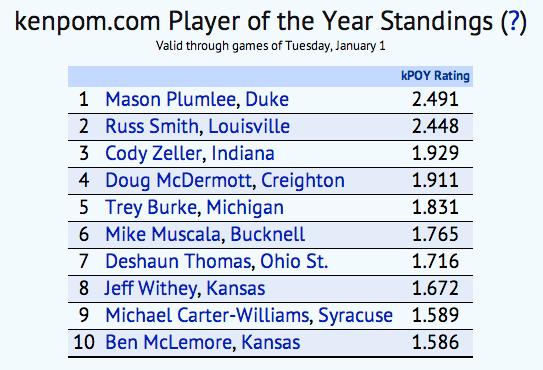I’ve turned on the kPOY leaderboard. This will update daily as player stats are updated.
The kenpom.com Player of the Year award is not designed to predict the human POY winner. It’s not really designed to be a contrarian award, either. It’s just a way to identify the most valuable player in the land. (Do the other awards out there do this? I’m not even sure.) This will be the third year of the award and previous winners include Draymond Green (2012) and Jared Sullinger (2011).
The underpinnings of the award are based on the calculations that produce the preseason ratings. This part of the calculation tries to identify how valuable a player is to his team. That’s only the first part, though, since the kPOY is all about contributing to success. So in my secret formula, the value to the team is multiplied by the team’s skill level and – boom – you get the number that determines a player’s standing in the kPOY world.
This year, I’ve changed the way the team aspect is used. Without getting into the details, the old calculation didn’t transfer well to determining conference-level kPOY’s, and I’ll eventually post all-conference teams. On the national race, this tweak will have the effect of giving players on weaker teams a slightly better chance at appearing in the standings than they did in prior seasons.
On a related note, the “team strength” component uses my ratings, which might have a large discrepancy from an AP-style ranking. If you are looking for, say, Brandon Paul in my list, the large difference between the Illinois’ AP ranking and my ranking largely explains his omission.
While a computer-based award might seem illegitimate relative to human-based awards, there are some advantages to having a formulaic approach. Among them…
1) The computer doesn’t discriminate against personal factors. For instance, if a player is a great story or just a likeable guy in general or has a personal relationship with a voter, he might get preferential treatment. The computer doesn’t care about this stuff. It doesn’t care that Russ Smith was a total screw-up last season. That really shouldn’t be a factor in determining this season’s winner.
2) It doesn’t discriminate against pace. There isn’t a Mike Scott-situation in 2013, but if Talib Zanna started getting more minutes for Pitt we could start a conversation. If Wyoming somehow continues to win without Luke Martinez, Leonard Washington will have a case as well. A player shouldn’t be penalized simply because he is on a team that uses a lot of shot-clock.
3) It sees efficiency. I’m pretty sure most voters in other awards are looking at points, rebounds, assists, and blocks. This award sees how efficiently a player gets his points. Missed shots and turnovers are penalized here. (In some sense, it’s still about pace-adjusted bulk stats, though. Minutes played are a factor.)
4) It doesn’t forget anybody. People make mistakes and we occasionally see this in poll-type voting where a team mysteriously disappears from someone’s ballot. Or in a Wooden Award list where someone just forgets about a player. The computer doesn’t do this. (At least, if there are no bugs in my code.)
Some observations about the initial list…
It’s really a two-man race at this point between Mason Plumlee and Russ Smith. I’ve been championing Smith’s case simply because he doesn’t seem to be getting a fair shake nationally. In addition to large improvements in shooting percentages, Smith plays for the #1 ranked defense in the nation and he plays a significant part in that.
At #3, Cody Zeller has fallen out of favor with the national media and this is another interesting development considering he’s the opposite of Smith in almost every way. Zeller’s numbers are up across the board from last season, which is partly due to the weak schedule the Hoosiers have played. However, when you consider his impressive production against the five top-100 opponents on Indiana’s ledger thus far, he’s probably not due for a ton of regression in league play. His worst games to date have come against Coppin State, Jacksonville, and Georgia.
The name that is out of place here is Bucknell’s Mike Muscala. In his defense, if you were fine with Isaiah Canaan or C.J. McCollum being all-American candidates, Muscala has been as good as those two guys and his team has been better. Muscala basically is Bucknell – he’s the best on the team at nearly every basketball-related skill, and is a top 500 player in 13 of 15 categories tracked on this site. That’s incredible. If the Bison continue to have success, he’ll remain on the list.
I’m not going to comment too much on the race going forward. The leaderboard will update with each day’s data and remember, unlike other awards, those updates continue through postseason play.


